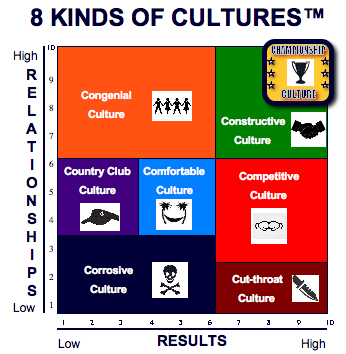The following is from Jeff Janssen....
WHAT KIND OF CULTURE DO YOU HAVE? DISCOVER THE 8 KINDS OF CULTURES
IS YOUR TEAM’S CULTURE WHERE YOU WANT OR NEED IT TO BE?
Do you have a positive and productive culture firmly in place that helps you win on and off the playing fields?
Or are you frustrated because you seem to have a Country Club Culture where many of your athletes are too soft, lazy, and entitled?
Or worse yet, do you have a Corrosive Culture filled with conflicts, criticism, and cliques that distract, divide, and destroy your team from within?
Unfortunately, many coaches don’t realize the full impact of their culture - until it’s too late. For example, in the frustrating last days of his coaching career at Illinois, former men’s basketball coach Bruce Weber candidly lamented to the media, “You have got to develop a culture. I think the last three years all I worried about was winning rather than developing a culture. I am disappointed in myself for not developing a culture of toughness with our team.”
Your team’s culture has a powerful, persistent, and pervasive impact on everything you do in your program. It impacts recruiting, attitude, commitment, competitiveness, chemistry, etc. Because of this, you must invest the time to continually mold, monitor, measure, and maintain your culture throughout the course of a season.
To build a winning culture, you must first honestly and accurately assess your current culture.Being privileged to work closely with hundreds of programs each year through our
Leadership Academies, here are the eight most common kinds of cultures I see when working with a variety of teams. I've categorized the eight cultures based on how much the particular culture values and emphasizes both relationships and results. See which of the eight best describes the current state of your program.
8 KINDS OF CULTURES™
1. CORROSIVE CULTURE

A Corrosive Culture is highly toxic and is characterized by a lot of conflict, negativity, frustration, cliques, gossiping, distrust, and selfishness. It is obviously not one that is fun to be around and the turmoil and tension off the field/court almost surely affects the team on it. From a relationship standpoint, cliques will often develop that divide, distract, and destroy the team. Rather than battling your opponents, your athletes spend more time battling each other and the coaching staff because no one is on the same page working toward the same goal.
From a results standpoint, people become apathetic or even resistant toward team goals because they lose respect for their coaches and/or teammates. In Corrosive Cultures there is a lot of selfishness because in such a negative and dysfunctional environment, members basically must look out for themselves because they don’t trust their teammates and coaches. As the name suggests, Corrosive Cultures eat away at people’s attitudes, commitment, and chemistry much like a caustic acid. Ultimately, people just seek to endure in this kind of culture or escape it whenever possible.
2. COUNTRY CLUB CULTURE

The Country Club Culture is one of entitlement, appearances, and leisure. The priority in this culture is to look good and to have a good time rather than to win championships. It is a superficial and soft culture where little accountability is expected from its members so people are allowed to coast. Playing time and leadership positions are often not based on merit but instead on politics, popularity, and brown-nosing. The currency in a Country Club culture of is much more about style than substance. Status in a Country Club Culture is accrued primarily by the kind of gear people wear. Results are clearly secondary and relationships are superficial at best.


 A Corrosive Culture is highly toxic and is characterized by a lot of conflict, negativity, frustration, cliques, gossiping, distrust, and selfishness. It is obviously not one that is fun to be around and the turmoil and tension off the field/court almost surely affects the team on it. From a relationship standpoint, cliques will often develop that divide, distract, and destroy the team. Rather than battling your opponents, your athletes spend more time battling each other and the coaching staff because no one is on the same page working toward the same goal.
A Corrosive Culture is highly toxic and is characterized by a lot of conflict, negativity, frustration, cliques, gossiping, distrust, and selfishness. It is obviously not one that is fun to be around and the turmoil and tension off the field/court almost surely affects the team on it. From a relationship standpoint, cliques will often develop that divide, distract, and destroy the team. Rather than battling your opponents, your athletes spend more time battling each other and the coaching staff because no one is on the same page working toward the same goal. The Country Club Culture is one of entitlement, appearances, and leisure. The priority in this culture is to look good and to have a good time rather than to win championships. It is a superficial and soft culture where little accountability is expected from its members so people are allowed to coast. Playing time and leadership positions are often not based on merit but instead on politics, popularity, and brown-nosing. The currency in a Country Club culture of is much more about style than substance. Status in a Country Club Culture is accrued primarily by the kind of gear people wear. Results are clearly secondary and relationships are superficial at best.
The Country Club Culture is one of entitlement, appearances, and leisure. The priority in this culture is to look good and to have a good time rather than to win championships. It is a superficial and soft culture where little accountability is expected from its members so people are allowed to coast. Playing time and leadership positions are often not based on merit but instead on politics, popularity, and brown-nosing. The currency in a Country Club culture of is much more about style than substance. Status in a Country Club Culture is accrued primarily by the kind of gear people wear. Results are clearly secondary and relationships are superficial at best.